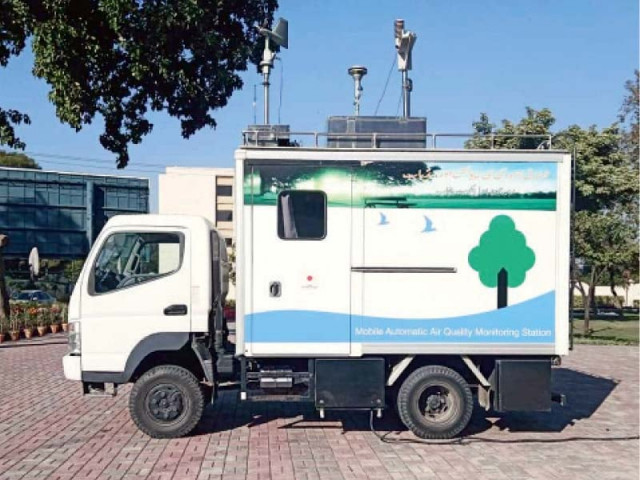Pindi to have air quality monitoring stations
System aims to record concentration levels of atmospheric pollutants

Like other major cities, the Punjab government is planning to install air quality monitoring networks in Rawalpindi.
The main objective of these networks is to record the concentration levels of atmospheric pollutants to define air quality levels and establish action plans if high levels of contamination are detected.
These stations, to be installed by the Strategic Planning and Implementation Unit (SPIU) and the Ministry of Environmental Protection, will keep track of air quality in various places such as residential areas, industrial areas, commercial areas and roadside areas.
Air quality monitoring networks allow the measurement, operation and predictive analysis of the evolution of air pollution in different areas (urban areas, industrial areas, special nature conservation areas, etc)
The SPIU and the Ministry of Environmental Protection have approved the mega project to monitor the air quality and smog in 10 districts of Punjab including the Rawalpindi district.
Tenders have been sought from international and national firms for installing these stations including the control rooms.
These stations will also be established in Lahore, Sheikhupura, Faisalabad, Bahawalpur, Dera Ghazi Khan, Gujranwala, Sargodha and Sialkot, which have higher air pollutants caused by pollution-emitting brick kilns and the burning of crop residues.
Smog-emitting vehicles and factories also contribute significantly to air pollution leading to respiratory diseases among citizens.
The installation of these 10 air quality monitoring stations would bring Punjab's total number of air quality monitoring stations up to 14.
Four such stations are already operational, one each at the deputy commissioner’s office in Lahore, the Ministry of Environment Main Office Lahore, at the Wagah border and one in Gujranwala.
Sources said that the selection of locations for the installation of these stations will be determined by the firms that will be awarded the project.
The Punjab Ministry of Environment Protection said that all funds have been allocated for the project. These stations will do away with the provincial government’s dependence on the private sector to check the air quality which inversely charge an exorbitant fee in exchange for sharing the air quality index.
Meanwhile, the Pakistan Environmental Protection Agency (Pak-EPA) has expedited a crackdown on smoke-emitting brick kilns, stone crushing units, industrial units and vehicles to prevent smog in the forthcoming winter.
Officials said that the agency has so far sealed a total of 66 brick kilns, 11 stone crushing units and five smoke-emitting industrial units besides seizing 35 obnoxious fume-emitting vehicles.
The agency has so far registered cases against 79 brick kilns and 10 industrial units for emitting smoke.
A total of Rs900,000 in fines was imposed on owners of smoke-emitting brick kilns, Rs150,000 on smoke-emitting industries, Rs100,000 on stone-crushing units and Rs150,000 on smoke-emitting vehicles.
Punjab Ministry of Environment Secretary Dr Naeem Rauf said that smog is likely to exacerbate in winter and the ongoing drive aimed to take prevent pollution. “We will seal all units, brick kilns and vehicles emitting obnoxious smoke before the onset of winter. The district administration will also take strict action against those who burn crops and garbage,” he said adding that the burning of crop residue, waste and garbage has already been banned.
The official said that a circular has been issued to deputy directors of all 36 districts of Punjab to take strict action against brick kilns using old technology. He said that no brick kiln that did not install the environmental-friendly zigzag technology will not be allowed to operate. “Raiding teams have also been formed for checking them. Only zigzag technology kilns are allowed to manufacture bricks,” he said.
According to the EPA, 1,225 brick kilns have been checked so far and of them, 66 were sealed while cases had been registered against 79 for not having zigzag technology.
Published in The Express Tribune, August 15th, 2022.



















COMMENTS
Comments are moderated and generally will be posted if they are on-topic and not abusive.
For more information, please see our Comments FAQ